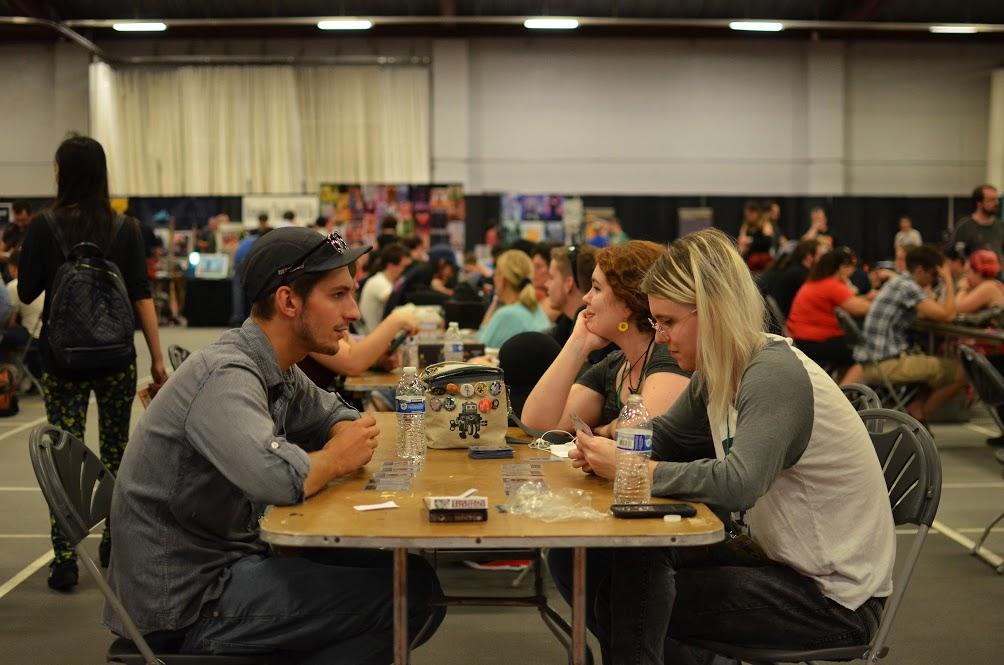By Jose Castillo, news staff
From the most dedicated combo breakers to the most casual button smashers, gamers packed Massachusetts Institute of Technology’s (MIT)’s Johnson Athletic Center on Saturday for the fourth annual Boston Festival of Indie Games.
Two floors of booths housing tabletop and digital games hosted swarms of overwhelmed gamers and eager developers. Exclamations of glorious virtual victory and cries of heartbreaking defeat vocalized the overall sense of community and passion for which indie culture prides itself.
“An indie game is a game you make independently, more or less without a big publisher giving you money,” Andrew Baillie, game developer and festival attendee, said. “The indie spirit is very do-it-yourself, very punk and the kind of mentality that you are doing what you can do with the resources you have.”
The keynote speaker for the event was Susan Gold, a professor of game design in Northeastern University’s College of Arts, Media and Design (CAMD).
“In game development, what we do is very strange for a lot of other people who work in the world,” Gold said to a crowd of festival-goers. “Our business models are strange, the fact that we work for years but have no return, yet are still proud and happy that we did them. We are typically very intense, devoted and focused in what we do.”
In 2008, Gold founded the Global Game Jam, a hackathon dedicated to game creation. The event seeks to connect the world through game development. Participants from 72 countries have 48 hours to create a video game, producing innovations in storytelling, game design and overall player interaction.
As an academic in photography and visual studies, Gold originally sought to explore narrative storytelling through pictures. Thrust into an education-related gaming project, she soon became involved in the world of game design.
Gold recalled the days before such programs existed.
“We got to see this evolution in gaming. Most people who worked in games had degrees in anything but games, there was no game degree,” she said. “The city of Boston said, ‘Hey, we we’re going to try to figure out a way to keep the brains from leaving Boston, since everyone is leaving for the west coast to make games; we have a brain drain and we have to fix it.’”
Gold praised the diversity of the community that expanded in Boston and explained that it is simply a trademark of game development communities everywhere.
“I try to tell my students, ‘you know, you could be a seven foot, transgender, Mohawk, doing anything you want in gaming, and you are still welcomed because you do good work, and that’s all people look at, that you do good work,’” Gold said.
The diversity of this community truly embodied itself in the games presented at the festival.
Baillie created the game “Remember You Will Die”, a role-playing game that he said challenges the gamer to ponder what really happens to the characters the protagonist kills.
“‘Remember You Will Die’ takes a traditional 16-bit action adventure format that people are familiar with and uses it to explore the high concept of death in games,” Baillie said. “In this demo I have here, in this dungeon [which the player starts in], there’s a lot of snakes that are not aggressive, and you don’t need to kill, but most people, without any prompt, will kill them on site, and I want people to think about that.”
“Remember You Will Die” is just one of over 150 games present at the festival. Others challenged conventions of both design and content.
Dan Roy, founder of Skylight Games, produced “Lyriko”, a learning game that teaches players a language through music. He presented the game at the festival.
“A long time ago, the people in learning games were a bit more forward-thinking,” he said, naming “Oregon Trail” as an early example of innovative game design. “Basically what happened was big publishers got involved and wanted to make money without really innovating. So instead of pushing the bar, they basically repackaged and resold the same thing over and over again.”
In her presentation, Gold encouraged gamers and developers to really reach out and help grow the local gaming community.
“I see this enormous growth of people wanting to make games and play games,” she said.
Photo by Robert Smith















